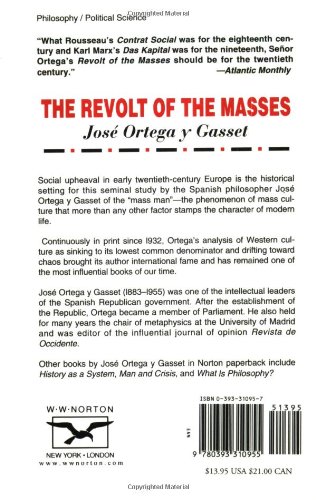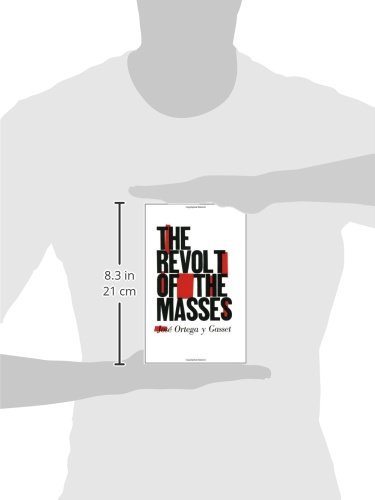



The Revolt of the Masses
K**R
This is one of the great books of last century
I highly recommend this book for those seeking to explain or understand what is currently happening in society. Ortega lays out the creation of the mass consumer and mass man who revels in mediocre accomplishments and who becomes for the continuing degeneration of culture. His description of how nations are formed is not to be missed.
D**S
Shipwrecked
What a muddle (most) reviewers have made of this book. I am reminded of De Tocqueville, whom all factions regard as "prescient" and appropriate him to their own positions. Let's get some facts straight, Gasset is a reactionary and an elitist, just as De Tocqueville was an aristocrat attempting to make sense of an alien American democracy. The difference is that De Tocqueville was only a reactionary in sentiment. He felt that democracy was inevitable. Not so Gasset, who believes that we MUST in some way turn back the clock. The ways he proposes that this might be done are, as another reviewer has noted, somewhat at odds with each other. So, perhaps, it's no great wonder that the reviews are muddled. Gasset is an intellectual descendant of Nietzsche, believing in the noble man above the masses. And, truly, this book at its heart, is more about the aristocratic man, than the aristocratic society, which is merely a means to this end. And, Gasset asserts, a true "society" is aristocratic by definition. Otherwise, it's not a society. But, to return to Gasset's aristocratic or noble man, who is a spin-off of Nietzsche's notion of the artist hero. If we keep our eyes on this notion, the book is a harrowing and effective plea for his existence. Unfortunately, Nietzsche came to America in the form of the distinctly middlebrow Ayn Rand, whose terrible writing and weighted, tendentious novels found a home in middlebrow America and started a harebrained literary tradition that continues this day. One of the longer-winded reviewers mentioned some of the most recently published books of this sort. Neither her character Howard Roark nor her vision of society: "A coal mine is more beautiful than Niagara Falls." - What twaddle - are at all what Nietzsche or Gasset has in mind. Oh well, one can't expect much from an author who can't spell her own name. Look, here is the type of soul Gasset adores and admires and is terribly worried is becoming extinct:"The man with the clear head is the man who frees himself from those fantastic "ideas" and looks life in the face, realizes that everything in it is problematic, and feels himself lost. As this is the simple truth - that to live is to feel oneself lost - he who accepts it has already begun to find himself, to be on firm ground. Instinctively, as do the shipwrecked, he will look round for something to which to cling, and that tragic, ruthless glance, absolutely sincere, because it is a question of his salvation, will cause him to bring order into the chaos of his life. These are the only genuine ideas; the ideas of the shipwrecked." P.157I have quoted at length because I believe this passage is at the root of what Gasset is all about here: The soul with a sense of the tragic inherent in life seeking from this existential shipwreck to wring his own foundered chaos of notions he calls himself is the essence of the noble, aristocratic artist-hero, to whom this book should have been dedicated. And, finally, perhaps Gasset was (sadly) right. The revolt of the masses and the engendering of their proclivities in what we would call a society leave no room for the preeminence of such a spirit.Finally, if one wishes to read these ideas in the original, close thy Gasset and open Nietzsche's Thus Spake Zarathustra.
K**T
On the Dangers of Lives Without Purpose and the Masses Who Have Them!
In our egalitarian age, we often scoff at any arguments that contain words like 'superior,' 'inferior,' or extol the value of hierarchy. So, many will instinctively cringe at the elitism - and it is elitism - that Ortega y Gasset exhibits in Revolt of the Masses, which essentially warns that societies who don't realize how much their existence is predicated on hierarchy of superiors to inferiors will become directionless and cease to exhibit excellence. But I hope those readers stick around, because there is more here than our egalitarian gut reactions can capture.Ortega starts off by defining what he means by 'mass man' and how he is different from the exceptional men. Mass men are those who are content where they are, have opinions but seldom really think and reflect, have no conception of themselves as creatures bounded in a a place, a time, and various social roles, and, in a sense, are simply directionless. Compare these to the exceptional people, those who live life with a sense of purpose (that has little or nothing to do with hedonistic egoism), strive for greatness, and have the thoughtfulness to 'make things happen.'Written in 1932, Ortega is concerned that several European countries are falling for doctrines like fascism and socialism that put most of their emphasis on 'mass man' rather than appreciating that civilization owes its existence, upkeep, and progress to the exceptional. Ortega is not advocating hereditary rule (has exceptionality is something deserved and earned, not inherited). But Ortega's concern - preficuring Schumpeter's Capitalism, Socialism, and Democracy: Third Edition ) is that the very processes that led to an improvement in everyone's conditions (presumably capitalism) was leading to its own destruction, by deluding the mass man into thinking that material comforts and abundance are just a naturally existing part of the world's fabric. Thus, the masses demand a certain easiness of condition that, in reality, must be worked for, and lack any appreciation that the very exceptional people they demean are the ones largely responsible for material comfort and abundance in the first place.Ortega is generally labeled a conservative, and I think this is somewhat accurate, though it would not be a stretch to call him a classical liberal either. Like conservatives in the vein of Burke and Oakeshott, Ortega displays a fierce disdain for ahistorical and rationalistic approaches to social thought - approaches that do not pay careful attention to the present as a contingent outcome of specific historical circumstances, or attempts to 'make the world over' as if we can deduce the proper first principles from pure reason rather than close historical study. In the vein of conservatism (a la Kenneth Minogue's Liberal Mind, The ), Ortega also suggests that a world where persons no longer act according to their roles in social hierarchies is a world that quickly leads to narcissism, hedonism, and directionlessness. For Ortega, one finds the most purpose in life when one sees oneself as bounded by place, time, existing social roles, and purposes OTHER THAN simple egoistic pleasure.For my money, I agree with Ortega on a good many things. His bemoaning of the purposelessness (and, because of that, the stupidity) he finds in the mass man can in many ways be read as a critique of modernism, where many people's primary goal is to keep up with everyone else and live for distraction (as opposed to purpose). Ortega's suggestion that the 'revolt of the masses' will lead to an ever-increasing egalitarianism that seeks to remove any whiff of tradition and (legitimately arising) hierarchy may also be playing out to various degrees.I have a few problems with this work, though, particularly owing to the author's oscillation between suggesting that he doesn't believe in historical determinism and reminding us that we must each fulfill our destiny. I've read and reread sections of the book, but do not see how the author can be interpreted as not contradicting himself (or what he means by 'destiny'). Also, the final chapter of the book (which many consider the best) is, to me, a very rhetorical jeremiad where Ortega obsesses over the thought that, in the future, Europe might not 'rule the world.' I simply hope this was not the primary impetus for writing the book, because if 'mass' is code for 'non-European' and 'superior' and 'excellent' are codes for 'European,' then a very interesting book becomes a mighty shallow one. (I personally read the book as if that chapter was simply a postscript.)Interesting read here, particularly for our egalitarian ears. Ortega's ideas may strike some as quaint or outmoded. But if one looks close, Ortega is, at least in some ways, writing about what we've become.
R**N
Profound and quite prescient
A classic piece of thinking from 1930. An often prescient portrayal of mass society, it is often surprising to reflect this was written 90 years ago. If you like intelligent writing, well worth reading.It is not always the easiest of reads - perhaps 1930s Spanish is just hard to translate into modern English. But I found most insightful and enlightening, even if I did not agree with absolutely everything. I have highlighted lots of parts - as there are many wonderful turns of phrase.The first 13 chapters are mostly excellent. The long penultimate chapter - chapter 14 I found the least rewarding, although it made me reflect on the recent decision of the UK to leave the EU, which again is an achievement for a book written a decade before WW2.
A**R
Beyond the Left and the Right
Living in Spain for the last years made me think that Ortega y Gasset had named half of the country’s streets. Reading this book I understood why. Short and concise, essential a series of essays that where independently published in his days, he tackles one of the least discussed changes of modern society, the rise of the Masses. Writing from what appears to be a politically neutral position, at least in the context of right wing/left wing divisions, he wonders how the new European man has identified not with a class or nation but with the Mass itself.
W**E
Like an inversion of Brave New World or 1984
An outstanding work. For those interested in social Darwinism or the philosophy of Nietzsche, then y Gasset here presents essential reading. Like an inversion of Brave New World or 1984, y Gasset presents a warning against the tyranny of the herd.
Z**S
Poor quality
The book was completely destroyed.
P**N
Ortega view that humanity will reduce its self to the ...
Ortega view that humanity will reduce its self to the lowest common denominator sadly has be born out to be true, but thankful, every now and again people that inspire come along and improve the world. Ortega was one of them
Trustpilot
1 week ago
3 days ago